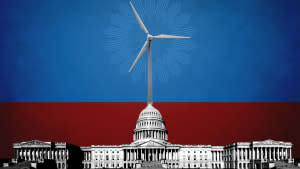Climate policy is the infrastructure that matters most
- Oops!Something went wrong.Please try again later.
- Oops!Something went wrong.Please try again later.

For the last several months, conservative Democrats like Sens. Joe Manchin of West Virginia and Krysten Sinema of Arizona have dominated the discussion of what the party can do. More left-wing Democrats have largely kept mute, likely figuring they'd have no choice but to eat whatever Manchin said was on offer.
However, the negotiations between Manchin, President Biden, and various Republicans have whittled down Biden's proposed infrastructure package so far that even some modestly progressive Democrats are starting to jump ship. The critical issue is climate change — as Senator Ed Markey (D-Mass.) told MSNBC's Chris Hayes, "They have a package which is climate denial masquerading as bipartisanship … No climate, no deal."
Markey is right; this is a perfect place to make a stand. Progressive Democrats (or even just any lawmakers who believe in climate change) should vote against any infrastructure bill that does not have a solid climate component.
In the first place, climate change is the worst problem facing humanity by far. It is absolutely imperative for the U.S. to do its part (or failing that, at least something significant) in concert with other countries. Climate policy is not some kind of utopian lefty scheme put forward by harebrained hippies; it's meant to deal with a screaming emergency that threatens all humanity, very much including Americans. For instance, right now almost the entire Southwest U.S. is in the grips of severe drought — Lake Mead, which provides water to some 25 million people, recently fell to its lowest level since being filled in the 1930s. A shortage declaration for the Colorado River basin is expected this August, which would cut water deliveries to lower states and Mexico. The threats to Florida from sea level rise, or the Midwest from chronic flooding, or farms from increasing temperatures, are if anything even more dire.
Leftists who demand a decent climate investment aren't asking for anything the Biden administration itself has not openly agreed is necessary. The "scientists told us three years ago we had 12 years to avert the worst consequences of climate crisis," John Kerry, Biden's special climate envoy, said back in February. Even Joe Manchin has said he wants a big climate investment, as he detailed in an op-ed co-written with Sen. Lisa Murkowski (R-Alaska) back in 2019. (By the way, West Virginia is a great candidate for a big buildout of wind power, thanks to its high mountain ridges and close proximity to east coast cities.) Any hardheaded, pragmatic look at what must be done to protect the country and its inhabitants would put climate policy at the top of the agenda.
Secondly, there is actually not all that much need for non-climate infrastructure investment from the federal government. The developing contours of the Senate negotiations look very much like a traditional highway bill, but most state and local governments can handle this well enough at the moment — in fact, some are having to brainstorm ideas just to spend the bailout money they already received from the American Rescue Plan. Very likely a lot of that will go to ordinary spending on roads, bridges, water and sewer systems, and so on. There is urgent need for federal investment in the form of interstate passenger rail upgrades, subsidies for zero-carbon power and research, regional electric grid upgrades, and so on.
Third, it is likely that there won't be more than one infrastructure bill, at least in this Congress. Passing anything, as we have seen over the last four months, is a gigantic pain in the neck. Doing some kind of crummy highway bill would likely eat up a lot of the juicier pay-fors (which are required if Democrats don't get rid of the filibuster) in the form of modest tax hikes on the rich and corporations, making any ambitious climate bill even harder.
Yet despite all this, even Biden's initial climate proposal was grossly insufficient, especially in the area of climate technology research. He would spend less ($35 billion) over eight years than Americans spend on pet food annually, and less than a tenth of what he promised during the 2020 presidential campaign.
It's of course impossible to say offhand what a sufficient climate bill would look like, but I would say Biden's campaign proposal of $400 billion in green research, plus the investments in Amtrak and decarbonization already proposed, is a rough sketch of the absolute bare minimum.
I am honestly baffled why Biden slashed his proposed green research spending by more than 90 percent relative to his campaign platform. If there is one problem to prioritize above all else it is climate change. It doesn't even theoretically trade off with Biden's broader political goals of creating jobs, re-shoring advanced technological research and production, being a global "leader" (more realistically, less of a global laggard), and so on.
Progressives are entirely justified in forcing his and Manchin's hand. Everyone in this conversation supposedly agrees that climate change is a dire threat to the United States. It's time they started acting like it.
